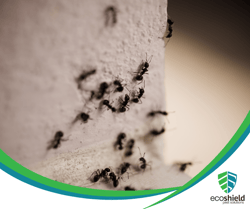 Have you ever wondered how long those pesky ants invading your kitchen can stick around? Ant lifespan might surprise you! As homeowners, understanding the lifespan of ants can provide valuable insights into how to manage and prevent infestations effectively. In this blog post, we'll delve into the fascinating world of ant longevity, exploring the factors that influence their lifespan and offering tips on keeping these tiny intruders at bay. Whether you're dealing with a persistent ant problem or simply curious about these resilient creatures, join us as we uncover the secrets behind how long ants really live.
Have you ever wondered how long those pesky ants invading your kitchen can stick around? Ant lifespan might surprise you! As homeowners, understanding the lifespan of ants can provide valuable insights into how to manage and prevent infestations effectively. In this blog post, we'll delve into the fascinating world of ant longevity, exploring the factors that influence their lifespan and offering tips on keeping these tiny intruders at bay. Whether you're dealing with a persistent ant problem or simply curious about these resilient creatures, join us as we uncover the secrets behind how long ants really live.
Do Ants Live a Long Time for Insects?
In the realm of insects, ants indeed boast a relatively long lifespan compared to many of their counterparts. While individual ant lifespans can vary depending on species, environmental factors, and the role they play within the colony, it's generally safe to say that ants live longer than most other insects.
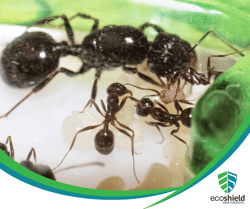 Worker ants, the individuals most commonly encountered by homeowners, typically have a lifespan ranging from a few weeks to several months. However, some species of worker ants can survive for up to a year or more under optimal conditions. Queens, on the other hand, are known for their remarkable longevity. These reproductive females can live for several years and, in some cases, even decades. Their primary role is to lay eggs and perpetuate the colony's existence, making their extended lifespan crucial for colony sustainability.
Worker ants, the individuals most commonly encountered by homeowners, typically have a lifespan ranging from a few weeks to several months. However, some species of worker ants can survive for up to a year or more under optimal conditions. Queens, on the other hand, are known for their remarkable longevity. These reproductive females can live for several years and, in some cases, even decades. Their primary role is to lay eggs and perpetuate the colony's existence, making their extended lifespan crucial for colony sustainability.
One notable factor contributing to the longevity of ants is their highly social nature. Ants live in organized colonies, with each member playing a specific role in supporting the colony's overall function. This social structure facilitates cooperation, division of labor, and collective defense, all of which contribute to the survival and longevity of the colony as a whole.
Additionally, ants have evolved various adaptations to thrive in diverse environments, further enhancing their lifespan. Their ability to forage efficiently for food, defend against predators, and adapt to changing conditions has undoubtedly contributed to their success as a species.
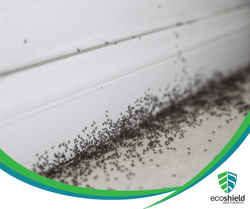 In summary, while ants may not live as long as some larger organisms, they certainly have a longer lifespan compared to many other insects. Their social structure, adaptability, and division of labor all play crucial roles in sustaining their colonies and ensuring their survival over time. Understanding the lifespan of ants can offer valuable insights for homeowners seeking to manage and prevent infestations.
In summary, while ants may not live as long as some larger organisms, they certainly have a longer lifespan compared to many other insects. Their social structure, adaptability, and division of labor all play crucial roles in sustaining their colonies and ensuring their survival over time. Understanding the lifespan of ants can offer valuable insights for homeowners seeking to manage and prevent infestations.
Does an Ant’s Lifespan Depend on Species?
Yes, an ant's lifespan can vary significantly depending on its species. Ant species exhibit a wide range of lifespans, influenced by factors such as their role within the colony, environmental conditions, and genetic predispositions. Let's take a closer look at a few different ant species and their lifespans.
Firstly, the notorious Argentine ant (Linepithema humile) is known for its remarkable longevity within colonies. These invasive ants can live up to several years, with queens surviving for even longer periods, sometimes reaching up to 15 years. Their ability to establish vast interconnected colonies contributes to their longevity and resilience.
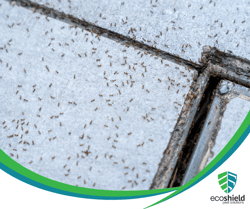 On the other hand, the lifespan of a worker ant in some species can be relatively short. For instance, the common pavement ant (Tetramorium caespitum) typically lives for about one to three years. These worker ants are crucial for colony maintenance, foraging, and caring for the queen's offspring. Despite their short individual lifespans, pavement ant colonies can persist for many years due to their reproductive strategies and colony organization.
On the other hand, the lifespan of a worker ant in some species can be relatively short. For instance, the common pavement ant (Tetramorium caespitum) typically lives for about one to three years. These worker ants are crucial for colony maintenance, foraging, and caring for the queen's offspring. Despite their short individual lifespans, pavement ant colonies can persist for many years due to their reproductive strategies and colony organization.
Another example is the leaf-cutter ants (Atta and Acromyrmex species), which inhabit tropical regions. These ants have a complex social structure with distinct castes, including workers, soldiers, and reproductive individuals. Worker ants in leaf-cutter colonies generally live for several months to a couple of years, while queens have significantly longer lifespans, ranging from a few to over a decade.
In contrast, certain desert ant species, such as Cataglyphis bombycina, have adapted to harsh environments with relatively short lifespans. These ants may only live for a few months due to the challenging conditions they face, including extreme temperatures and scarcity of resources.
Overall, it's evident that an ant's lifespan is intricately tied to its species' characteristics, habitat, and role within the colony. Understanding these variations can provide valuable insights into ant behavior, colony dynamics, and strategies for pest management in residential settings.
Can Ants Live Longer Indoors?
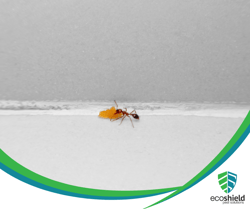 Ants are remarkably adaptable creatures capable of thriving in various environments, including indoors. While the lifespan of an ant can vary depending on factors such as species, environment, and individual health, it's often observed that ants can indeed live longer indoors compared to their outdoor counterparts. One significant reason for this phenomenon is the relatively stable and controlled conditions found within homes. Indoors, ants are sheltered from harsh weather conditions, predators, and other natural hazards that can significantly impact their survival outdoors.
Ants are remarkably adaptable creatures capable of thriving in various environments, including indoors. While the lifespan of an ant can vary depending on factors such as species, environment, and individual health, it's often observed that ants can indeed live longer indoors compared to their outdoor counterparts. One significant reason for this phenomenon is the relatively stable and controlled conditions found within homes. Indoors, ants are sheltered from harsh weather conditions, predators, and other natural hazards that can significantly impact their survival outdoors.
Additionally, the abundance of food sources commonly found in human habitats can contribute to an extended lifespan for indoor ants. Kitchens, pantries, and even crumbs left behind on dining tables provide a steady supply of sustenance, ensuring that ants have access to nourishment without the need to forage extensively. With a consistent food source readily available, indoor ants can allocate more energy towards reproduction and colony growth, potentially prolonging their lifespan.
Furthermore, the absence of natural predators indoors allows ants to thrive without the constant threat of being hunted. Outdoors, ants face numerous predators ranging from birds and other insects to small mammals, all of which pose a constant risk to their survival. In contrast, the controlled environment of a home provides a relatively safe haven where ants can focus on activities that contribute to their longevity, such as caring for their young and expanding their colony.
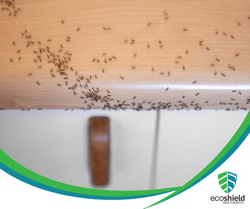 Examples of indoor ant species that have demonstrated extended lifespans include the common household ants like the Argentine ant (Linepithema humile) or the odorous house ant (Tapinoma sessile). These species have been known to establish thriving colonies within the confines of human dwellings, taking advantage of the shelter, food, and protection from predators that indoor environments offer. Consequently, homeowners may find themselves dealing with persistent ant infestations that seem to persist longer than expected, highlighting the adaptability and resilience of these tiny invaders when living indoors.
Examples of indoor ant species that have demonstrated extended lifespans include the common household ants like the Argentine ant (Linepithema humile) or the odorous house ant (Tapinoma sessile). These species have been known to establish thriving colonies within the confines of human dwellings, taking advantage of the shelter, food, and protection from predators that indoor environments offer. Consequently, homeowners may find themselves dealing with persistent ant infestations that seem to persist longer than expected, highlighting the adaptability and resilience of these tiny invaders when living indoors.
Will Ants in my Home Eventually Die Off on Their Own?
It's a common misconception that ants will eventually die off on their own once they've invaded your home. While it's true that individual ants have relatively short lifespans in the grand scheme, ranging from a few weeks to a few months, depending on the species, ant colonies are incredibly resilient. When ants find a steady food source and suitable nesting conditions within your home, they can establish thriving colonies that persist for years.
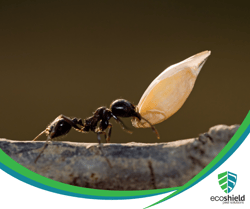 Ant colonies consist of thousands, or even millions, of individual ants, working together as a highly organized and efficient unit. They have a division of labor, with different ants fulfilling specific roles such as foraging for food, caring for the young, and defending the colony. This collective effort ensures the survival and longevity of the colony as a whole.
Ant colonies consist of thousands, or even millions, of individual ants, working together as a highly organized and efficient unit. They have a division of labor, with different ants fulfilling specific roles such as foraging for food, caring for the young, and defending the colony. This collective effort ensures the survival and longevity of the colony as a whole.
Additionally, ant colonies have a reproductive cycle that allows them to expand and replenish their numbers. Queens, which can live for several years or even decades, continually produce new ants to replace those that die off. These new ants ensure the colony's persistence and ability to withstand fluctuations in population.
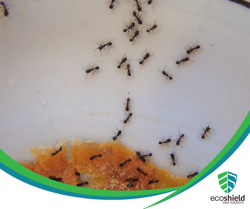 In some cases, ant infestations can persist indefinitely without intervention, causing ongoing nuisance and potential damage to your home. Therefore, relying solely on the natural lifespan of individual ants is not an effective strategy for eliminating an infestation. Instead, it's essential to take proactive measures to control and eradicate ants from your home, including identifying and sealing entry points, eliminating food sources, and using targeted insecticides or traps as needed.
In some cases, ant infestations can persist indefinitely without intervention, causing ongoing nuisance and potential damage to your home. Therefore, relying solely on the natural lifespan of individual ants is not an effective strategy for eliminating an infestation. Instead, it's essential to take proactive measures to control and eradicate ants from your home, including identifying and sealing entry points, eliminating food sources, and using targeted insecticides or traps as needed.
Ultimately, while individual ants may come and go, ant colonies have the remarkable ability to endure and thrive in a variety of environments, making it crucial for homeowners to take proactive steps to manage and prevent infestations effectively.
Can EcoShield Pest Solutions Treat Ant Infestations?
Yes, we do! In fact, the only way to ensure you banish ants for good is to utilize a reputable pest control service like EcoShield Pest Solutions. EcoShield’s botanical solutions are safe and effective in removing any kind of ant that sets up camp in your home. Our 100% guaranteed service will save you the stress of DIY solutions and recurring ant problems associated with them. EcoShield's proactive approach to ant control not only treats the primary pest issue but also focuses on preventing ants and other pests. Also, if the ants come back, so do we free of charge since touch-ups are included with the Shield Home Protection Plan!
Call us today for a free, no-obligation estimate and take back your home! Call us at (888) 744-1284 or fill out the form on this page.